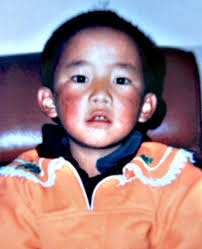
Today is the 27th birthday of Gedhun Choekyi Nyima, the reincarnate of the previous 10th Panchen Lama, one of the most important spiritual leaders of Tibet. On 17 May 1995, three days after His Holiness the Dalai Lama recognized him as the 11th Panchen Lama, Gedhun Choekyi Nyima and his parents disappeared from their home never to be heard or seen again.
Despite various appeals and campaigns from governmental and non-governmental organizations over the years, the Chinese government has not provided any concrete or verifiable evidence to support its claims that the Panchen Lama is living “a normal, happy life and receiving a good cultural education” and that he “does not want to be disturbed”. On 6 September 2015, responding to media queries, Norbu Dhondup, a senior official with the United Front Work Department of Tibet Autonomous Region reiterated these claims but failed to provide any evidence. The failure to provide any credible evidence on the condition and whereabouts of the 11th Panchen Lama makes the Chinese government guilty of the crime of enforced disappearance.
Enforced disappearance is a serious international crime that violates multiple human rights and fundamental freedoms enshrined in the Universal Declaration of Human Rights and other major international human rights instruments. During an enforced disappearance, the disappeared persons are potentially subjected to arbitrary arrest, extrajudicial detention, torture, inhumane treatment, and illegal executions.
The system of reincarnation is a unique Tibetan tradition based on the belief in rebirth and karma – two core Buddhist principles. Therefore, it is only logical that the Chinese government respect and uphold the recognition of the 11th Panchen Lama by Tibetan spiritual leader, the Dalai Lama. Instead the Chinese government claims that it has the “recognised rights” over Tibetan reincarnates and calls the Dalai Lama’s recognition “illegal” and “invalid”. The Chinese government does not believe in rebirth or the law of karma and considers religion poison. Despite this fact, the Chinese government controls, manipulates and interferes with Tibetan religious traditions, to further its own political agenda of systematically destroying Tibetan religious and cultural identity.
The Chinese government can never hope to win the hearts and minds of the Tibetan people by using religion for political ends. The failure of the Chinese-appointed Panchen Lama, Gyaltsen Norbu, to command genuine devotion and loyalty from the Tibetan people attests to this fact. The continuing disappearance of Gedhun Choekyi Nyima has scarred the hearts of pious Tibetans. No amount of soft power initiatives on the part of Chinese government in the international arena can whitewash the crime of enforced disappearance. Therefore the Chinese government must not to let politics influence religion.
Under the ‘Measures on the Management of the Reincarnation of Living Buddhas in Tibetan Buddhism” implemented since 2007, the Chinese government has issued certificates to ‘validate’ Tibetan reincarnate lamas, a policy aimed at using Tibetan religious personalities for political ends. On 18 January 2016, the Chinese government made public a database on Tibetan reincarnate lamas that is aimed at further tightening control over reincarnate lamas and religious heads by using them to successfully implement campaigns such as ‘patriotic education’ that seeks to manage and restrict freedom of religion and belief of the Tibetan people.
The Chinese government’s claim that the growing number of monasteries and monastics enjoying better physical facilities is an indication of overall development in Tibetan Buddhist culture and freedom of personal faith and devotion is misleading and false. In reality, the subsequent policies and campaigns have steadily eroded the sacred tradition of the centuries-old Buddhist learning and practice, the bond between the master and the disciple, and the system of Buddhist empowerment.
As the 21st anniversary of enforced disappearance of Gedhun Choekyi Nyima nears, TCHRD reiterates its call to the Chinese government to release him without without further delay or conditions. TCHRD further urges the Chinese government to consider favorably appeals from various international organizations to allow independent international agencies to meet with Gedhun Choekyi Nyima and his family to ascertain their welfare and wellbeing. TCHRD appeals the international community to continue questioning the Chinese government on the fate of the 11th Panchen Lama Gedhun Choekyi Nyima and many other Tibetans who have become victims of enforced disappearance.
